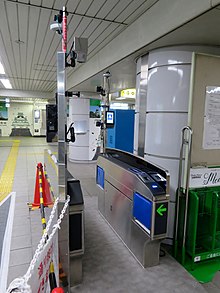
Back نظام تعرف الوجوه Arabic اۆز تانیما سیستمی AZB মুখমণ্ডল শনাক্তকরণ পদ্ধতি Bengali/Bangla ངོ་རིས་ངོས་འཛིན། Tibetan Sistema de reconeixement facial Catalan Systém pro rozpoznávání tváře Czech Ansigtsgenkendelsessystem Danish Σύστημα Αναγνώρισης Προσώπου Greek Sistema de reconocimiento facial Spanish Näotuvastus Estonian
This article's factual accuracy may be compromised due to out-of-date information. (June 2022) |


A facial recognition system[1] is a technology potentially capable of matching a human face from a digital image or a video frame against a database of faces. Such a system is typically employed to authenticate users through ID verification services, and works by pinpointing and measuring facial features from a given image.[2]
Development began on similar systems in the 1960s, beginning as a form of computer application. Since their inception, facial recognition systems have seen wider uses in recent times on smartphones and in other forms of technology, such as robotics. Because computerized facial recognition involves the measurement of a human's physiological characteristics, facial recognition systems are categorized as biometrics. Although the accuracy of facial recognition systems as a biometric technology is lower than iris recognition, fingerprint image acquisition, palm recognition or voice recognition, it is widely adopted due to its contactless process.[3] Facial recognition systems have been deployed in advanced human–computer interaction, video surveillance, law enforcement, passenger screening, decisions on employment and housing and automatic indexing of images.[4][5]
Facial recognition systems are employed throughout the world today by governments and private companies.[6] Their effectiveness varies, and some systems have previously been scrapped because of their ineffectiveness. The use of facial recognition systems has also raised controversy, with claims that the systems violate citizens' privacy, commonly make incorrect identifications, encourage gender norms[7][8] and racial profiling,[9] and do not protect important biometric data. The appearance of synthetic media such as deepfakes has also raised concerns about its security.[10] These claims have led to the ban of facial recognition systems in several cities in the United States.[11] Growing societal concerns led social networking company Meta Platforms to shut down its Facebook facial recognition system in 2021, deleting the face scan data of more than one billion users.[12][13] The change represented one of the largest shifts in facial recognition usage in the technology's history. IBM also stopped offering facial recognition technology due to similar concerns.[14]
- ^ "Face Recognition based Smart Attendance System Using IoT" (PDF). International Research Journal of Engineering and Technology. 9 (3): 5. March 2022.
- ^ Thorat, S. B.; Nayak, S. K.; Jyoti P Dandale (2010). "Facial Recognition Technology: An analysis with scope in India". arXiv:1005.4263 [cs.MA].
- ^ Chen, S.K; Chang, Y.H (2014). 2014 International Conference on Artificial Intelligence and Software Engineering (AISE2014). DEStech Publications, Inc. p. 21. ISBN 9781605951508.
- ^ Bramer, Max (2006). Artificial Intelligence in Theory and Practice: IFIP 19th World Computer Congress, TC 12: IFIP AI 2006 Stream, August 21–24, 2006, Santiago, Chile. Berlin: Springer Science+Business Media. p. 395. ISBN 9780387346540.
- ^ SITNFlash (October 24, 2020). "Racial Discrimination in Face Recognition Technology". Science in the News. Retrieved July 1, 2023.
- ^ "Facial Recognition Technology: Federal Law Enforcement Agencies Should Have Better Awareness of Systems Used By Employees". www.gao.gov. Retrieved September 5, 2021.
- ^ Security, Help Net (August 27, 2020). "Facing gender bias in facial recognition technology". Help Net Security. Retrieved July 1, 2023.
- ^ Team, Lumen Database (May 5, 2021). "Sexism in Facial Recognition Technology". Berkman Klein Center Collection. Retrieved July 1, 2023.
- ^ Understanding bias in facial recognition technologies
- ^ Wiggers, Kyle (March 5, 2022). "Study warns deepfakes can fool facial recognition". VentureBeat. Retrieved June 4, 2022.
- ^ Cite error: The named reference
:10was invoked but never defined (see the help page). - ^ Rachel Metz (November 2, 2021). "Facebook is shutting down its facial recognition software". CNN. Retrieved November 5, 2021.
- ^ Hill, Kashmir; Mac, Ryan (November 2, 2021). "Facebook, Citing Societal Concerns, Plans to Shut Down Facial Recognition System". The New York Times. ISSN 0362-4331. Retrieved November 5, 2021.
- ^ "IBM will no longer offer, develop, or research facial recognition technology". June 9, 2020.
© MMXXIII Rich X Search. We shall prevail. All rights reserved. Rich X Search